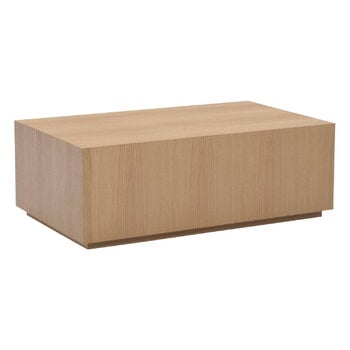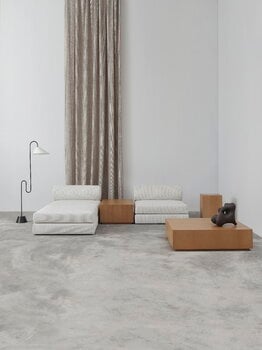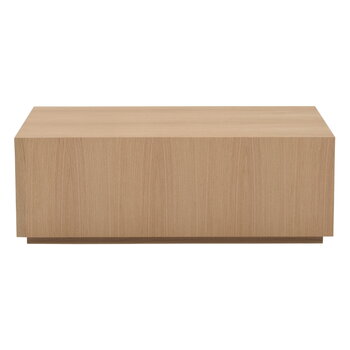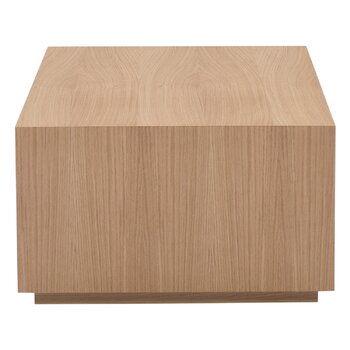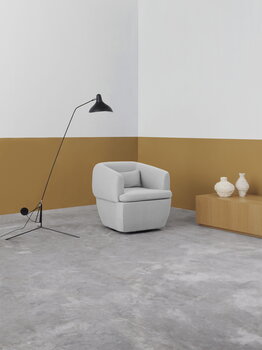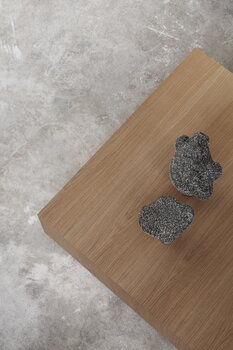Interface’s Box table is a simple yet elegant companion to the sofa. Designed by Laura Seppänen, the minimalistic Box coffee tables are made of beautiful oak veneer, adding harmonious warmth to the décor. The Box tables look charming both alone and in various combinations, and they also go together seamlessly with Interface's modular Lollipop series. The Box table, made in Finland, is a sophisticated addition to both the living room and public spaces alike.
Box coffee table, 90 x 50 x 35 cm, oak
Interface
Description
Interface’s Box table is a simple yet elegant companion to the sofa. Designed by Laura Seppänen, the minimalistic Box coffee tables are made of beautiful oak veneer, adding harmonious warmth to the décor. The Box tables look charming both alone and in various combinations, and they also go together seamlessly with Interface's modular Lollipop series. The Box table, made in Finland, is a sophisticated addition to both the living room and public spaces alike.
Product details (6)
- Colour
- Lacquered oak
- Length
- 90 cm
- Width
- 50 cm
- Height
- 35 cm
- Material
- Lacquered oak veneer
- Weight
- 26 kg
- Product ID
Designer
Laura Seppänen is a multi-talented Finnish designer, known not only for her work as an interior and furniture designer but also as a stylist and an editor. Laura Seppänen founded her own Helsinki-based L/S Design Agency in 2015 and her minimalistic work has since been widely showcased in both domestic and international publications.
With a focus on spatial, furniture and product design, Seppänen has also collaborated with, among others, Finnish furniture manufacturer Interface for whom she designed the modular Lollipop series.
View all productsReviews (0)
Sustainability
The Product Sustainability Framework, our criteria of sustainable design, helps you find the most sustainable products in our selection. Read below which sustainability criteria this product has met.
Working conditions & labour 7/9
-
Equal opportunities for all employees
-
Commitment to UN Global Compact, fair compensation for all employees
-
Corporate responsibility requirements defined and communicated for suppliers
-
Systematic work for improved inclusion and well-being in the workplace
-
Transparent supply chain
-
Suppliers' compliance to a code of conduct ensured
-
Compliance to the UN Guiding Principles on Business and Human Rights ensured in the supply chain
-
Direct suppliers audited and certified
-
Support for community involvement in the supply chain
Eco-friendly production 8/9
-
Fair and resource-wise water-use in production
-
No incineration or landfilling of returned items
-
No use of endangered species as materials
-
No direct environmental emissions or waste (excl. GHGs) from production
-
The sustainability of direct suppliers' production is addressed and monitored
-
Production and material sourcing that respect biodiversity, animal rights, and natural ecosystems
-
Material-efficient and ecological packaging
-
No potentially harmful chemicals used in own production
-
Positive impact on nature’s well-being through operations that regenerate natural ecosystems
Climate impact 6/8
-
Company's direct greenhouse gas emissions identified and commitment to reduction
-
Product's carbon impact identified and commitment to reduction
-
Guidance on energy- and eco-efficient use of the product
-
Contribution to climate initiatives beyond the brand’s direct operations
-
Low-carbon or compensated transportation
-
100 % renewable energy in own production and operations
-
Carbon footprint of the product calculated and goals set to reduce it
-
Carbon neutral or carbon negative product
Sustainable materials 6/6
-
Sustainable and long-lasting material choices
-
No harmful or hazardous substances
-
Responsible raw material sourcing and production
-
Materials suited for circularity: monomaterials, recyclable finishings, renewable or recycled contents etc.
-
Ecological materials: natural, biodegradable, recyclable or recycled contents
-
Outstanding materials in terms of innovativeness, responsibility, sustainability and circularity: local production or sourcing, 100 % recycled content, C2C-certification etc.
Circular design 4/5
-
High aesthetic quality promoting long-term use of the product
-
Technically durable product design and material choices
-
Design for enduring life-long quality
-
Design and support for product maintenance, repair and upgradability
-
Innovative circular design solutions: circular service system, resale platform, remanufacturing, collection of used products, etc.
